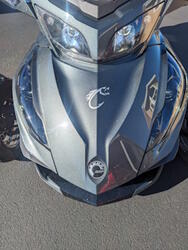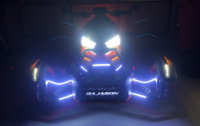|
-

I do a lot of engine braking. My Daytona is a SM6 !! What’s the problem ?!?!? 
 White
White 2015 F3-S SE6 - “ Gypsy” (hers)
Yellow 2017 F3-S Daytona 500 SM6 (his)
-

To each his own. Don’t think computer will let you do anything to really hurt the engine on the SE trannies.
 White
White 2015 F3-S SE6 - “ Gypsy” (hers)
Yellow 2017 F3-S Daytona 500 SM6 (his)
-
Very Active Member


I downshift on hills all the time to control speed, and sometimes coming to a stop sign. If they did not want you down shifting the SE6, they would have blocked it from occurring. It is a feature they gave us, so use it if you want to or don't use it. It is up to the rider!
2018 RT Ltd - Asphalt Metallic - East Valley of Phoenix
2018 RT Ltd Chrome - Champagne Metallic - Lake Stevens, Wa
(Champagne/Hooker) Magic Mirrors, 360 LED head lights, BajaRon sway bar, H&R springs and shock adjusters, dash cam, foam grips, third brake light 4 LED strobe for 7 seconds and then on steady, rear LED turn signals/8 ohm 50W resistors, sequential turn signals on front fenders, Vredestein and PPA Orb wheels on front and General out back, and driver backrest.
Things that move between machines: Ikea sheep skins, Zumo XT GPS, and extra tools. Hooker is going to be my summer trike up North; and Hookie my winter trike down South.
(Asphalt/Hookie) Elka shocks on front - BajaRon sway bar, OEM driver's backrest, LED headlights, dual USB with voltmeter, dash cam, foam grips - Magic Mirrors - front tires Vredestein Quatrac SL on PPA ORB Chrome wheels.

-
Very Active Member


Couldn't imagine not using engine braking when riding the twisties. I regularly manually downshift.

2022 RT Sea To Sky
--------------------------------
-
Very Active Member


 Originally Posted by ThreeWheels

I know all the arguments that the Spyders are designed for downshifting. Nevertheless brakes cost far less than transmissions. I slow down using brakes. Why tempt fate?
Wearing out a transmission with engine braking is a myth.
I've been riding and wrenching on mine and others bikes since 1969. I've replaced a great number of brake pads, shoes (for those who even know what they are) and rotors. Never once have I known or heard of anyone needing to replace any transmission components because of engine braking. Most motorcycle riders use it all the time.
Using the correct lubricant, your transmission gears rarely or never touch even under hard acceleration. Engine braking puts less load on your gears than does hard acceleration. If you're going to wear gears, it will be with the hours upon hours your moving forward. Not the few moments you're using engine braking. Plus, engine braking engages the back side of the gear teeth. The side that cannot wear at all unless you use engine braking.
With big advantages to engine braking and no downsides, it's a very good habit to get into. You'll be riding safer, and saving money on brakes and rotors the entire time.
-

I didn't read every post to see if this was mentioned, but when in traffic I use the brake to make sure my brake lights come on for the cars behind me.
2019 Spyder RT Ltd. Bought in Jan 2024. Can-Am states only.

Slingmods USB and QuadLock phone mount with vibration dampener | Highway pegs
Rear GENERAL ALTIMAX RT45 SL 225/60R-15 tire | Drink2Go front/rear Cupholders
3D printed Turn Signal/Shifter caps | KOTT Grill covers
LED Headlights | LED Foglights | High Mount Trunk brake/turn lights with brake strobe
Pedal Box+ w/BT | Show Chrome gas shock for rear trunk
Foam Grips | Red Rim Covers
VIOFO MT1 Front/Rear Dash Cam system | Upper Radiator Exhaust Block (SpyderPops)
ShowChrome Heavy Duty seat shock | RLS Cat/Primary Muffler Delete
BRP Intake Air vents
-
Very Active Member


 Originally Posted by Allen42

I didn't read every post to see if this was mentioned, but when in traffic I use the brake to make sure my brake lights come on for the cars behind me.
Yes, and highly recommended to use both engine braking and at least a light touch on the brakes. Lets people behind you know what you're doing and also prepares you for a stop quicker than you expected.
-
Active Member


About a 50/50 split for me - depending on where and how I am riding. I'm not that aggressive, so I don't think I load up either system when slowing down.
Last edited by Peter Aawen; 03-25-2024 at 06:21 PM.
Reason: wither ;-)
-
Very Active Member


 Originally Posted by BajaRon

Wearing out a transmission with engine braking is a myth.
Perhaps so, but my first Spyder, a 2010 model (which, by the way, handled like a dead pig until you came out with your sway bar upgrade) had the clutch plates go with only 10,000 miles in less than a year.
BRP didn't want to replace the clutch plates under warranty, saying that the clutch was a wear item and this was normal wear for a big bike. I'd had several big bikes prior to my Spyder with no clutch problems at all. I still miss my 1984 Yamaha Venture Royal XVZ12.
Yamaha Venture Royal.jpg
I replied, so let me understand, the clutch wears out before the brakes? At that point BRP was kind enough to replace the clutch plates.
Again, I ask why tempt fate if you don't need to.
Of course when braking for long periods of time, such as going downhill, engine braking is best. But in daily traffic?
We all have our little quirks, and that's mine.
I stand by my comments but have no need for anyone to copy my style or preferences. To each, their own.
You say potato, I say potato....................
If it ain't broke, don't break it.
IBA #47122
2020 RT Limited Asphalt Grey
-

Yo Mike, no war here, light on/off foot brake is my method of choice, unless of course conditions dictates differently. Nanny pretty much figures it all out for me and makes riding a real joy.
-
Very Active Member


 Originally Posted by ThreeWheels

Perhaps so, but my first Spyder, a 2010 model (which, by the way, handled like a dead pig until you came out with your sway bar upgrade) had the clutch plates go with only 10,000 miles in less than a year.
BRP didn't want to replace the clutch plates under warranty, saying that the clutch was a wear item and this was normal wear for a big bike. I'd had several big bikes prior to my Spyder with no clutch problems at all. I still miss my 1984 Yamaha Venture Royal XVZ12.
Yamaha Venture Royal.jpg
I replied, so let me understand, the clutch wears out before the brakes? At that point BRP was kind enough to replace the clutch plates.
Again, I ask why tempt fate if you don't need to.
Of course when braking for long periods of time, such as going downhill, engine braking is best. But in daily traffic?
We all have our little quirks, and that's mine.
I stand by my comments but have no need for anyone to copy my style or preferences. To each, their own.
You say potato, I say potato....................
The Spyder clutch (998 & 1330) will normally last the life of the machine if used as designed. Unfortunately, especially with the SE models, the clutch will not last very long at all if 'abused'. Now, of course, most do not purposefully abuse their clutch, though we do have a customer or 2 that do. Here is my opinion (which is worth what it will cost you) on the 'Whys'. But engine braking isn't going to be one of them since this exerts much less stress on the clutch than acceleration. And it will always be done at higher RPM's giving you full clutch plate lockup. It's slipping that ruins a clutch. Once it's locked up, which happens right away in engine braking, the clutch doesn't care at all.
#1 - On an SE model, running too low RPM. People do this for a number of reasons. They came off a machine where high RPM was detrimental. Or they don't like the sound of a higher revving engine because 'It sounds like it's hurting the machine'. But the Spyder needs to maintain about 3,500 RPM to fully couple the clutch plates under load (SE models only). This is not a hard and fast rule. But if you don't know the nuances, just keep your upshifts to at least 3,500 RPM when you land in the new gear. Obviously, engine braking, done reasonably, will not damage your clutch plates. An SM model clutch does not care about RPM because it fully engages as soon as you fully release the clutch lever.
#2 - Using the wrong oil. This will destroy a clutch even more quickly than running an SE at too low an RPM. This will damage a clutch in both the SE and SM. Many people stick with the OEM oil because they are worried about getting the wrong oil. But it's very easy to get a better, less expensive or equally priced engine oil with zero worries about creating this issue. Just get a full synthetic 5/40, 10/40 or 15/40 that is JASO MA2 rated. It's as simple as that. There are oils that meet the JASO MA2 rating but have chosen not to spend the money to get certified. You need to be careful here. But if you do your homework, this can also be a viable option. I've had some customers say they've used OIL A in their various motorcycles for years without issue and they plan to do the same with their Spyder. Don't do it unless the oil you've been using meets the above criteria. Don't find out the hard way that you used the wrong engine lubricant.
#3 - I have a few customers who really flog their Spyder (manual transmission). I'm not sure exactly how they are using the clutch, but they have managed to burn them up. I've drag raced my 2008 998 several times with no clutch damage so I'm not sure what the difference is. But I suspect they are using the clutch to shift. You should use a clutchless shift if you are drag racing. But be careful. Done wrong, a clutchless shift can give you a great deal of grief. Fortunately, it's not a difficult maneuver to master.
Observe these things and you'll never get a complaint from your clutch. This is why BRP didn't want to replace your clutch. In most cases, the failure was caused by improper usage of some kind.
Last edited by BajaRon; 03-27-2024 at 09:16 AM.
-

Ron, of the three weights, 5/40, 10/40, or 15/40, can you rate your first choice, or does it even matter?
-
Very Active Member


 Originally Posted by bikerbillone

Ron, of the three weights, 5/40, 10/40, or 15/40, can you rate your first choice, or does it even matter?
All of this is a blend of personal experience and research. I don't think you'll find too many subjects with a wider range of opinions or more adamant adherents than which oil to use. Just for the record, and certainly not directed at anyone in particular. I enter this arena as a FRIENDLY discussion. If anyone has a different opinion - That is 100% fine with me.
For most, I really like the 10/40. It is the oil that BRP recommended for the Spyder before they discontinued the 10/40 that they sold. Several years back BRP consolidated their oil line up. They now cover a lot more vehicles with a single lubricant than before.
If you are in a hot climate, 15/40 may be a good choice. But I'm talking a Spyder regularly running in 95 degrees or higher. And if your preferred oil comes only in a 5/40, then by all means, go for it. Especially if it's a full synthetic. My reasoning is based somewhat upon the fact that the narrower the spread between the low and high number, the more stable and able to resist shearing (the shredding of the oil molecule which reduces viscosity, the high number) an oil will be. Shearing can be a big problem when a motor oil is also asked to lubricate a transmission. Most transmissions have a separate compartment and run a completely different lubricant specifically engineered to address this. Because transmission gears tend to crush the oil. A situation which is really not an issue in the engine.
My real beef is with a blended oil. 'Blended' is a word designed to make a bad idea sound really good. It's called marketing. Blended almost always means you're getting 90% regular oil with 10% full synthetic oil blended in. Here is how I look at it. Take 90% tap water and blend in 10% crystal clear mountain spring water. Did you improve the tap water? Or did you ruin perfectly good spring water? Which side of this question you come down on may help you decided if you want full synthetic or a blended oil. The XPS oil recommended for the Spyder is a blended product.
It is a proven fact that both the 998 and the 1330 shear the XPS 5/40 down to a 5/20 viscosity after about 5,000 miles. A steep decline in viscosity begins around 4,500 miles. It is interesting that the 998 had a 4,500 mile service interval. Right where BRP's oil began to give up and shear drastically. The same thing happens in the 1330 - But it has a recommended service interval of 9,300 miles...
Last edited by Peter Aawen; 03-26-2024 at 04:29 PM.
-
Very Active Member


 Originally Posted by BajaRon

Observe these things and you'll never get a complaint from your clutch. This is why BRP didn't want to replace your clutch. It was caused by user error.
Thank you for your input Ron. I'm sorry to say that you are absolutely wrong on this point. The clutch failed because it was installed wrong at the factory. I've been riding for over 50 years and this was the only clutch that I've lost.
I appreciate your input and respect you too much to start a flame war.
You ride the way you wish, and I'll ride the way I wish.
If it ain't broke, don't break it.
IBA #47122
2020 RT Limited Asphalt Grey
-
Very Active Member


 Originally Posted by ThreeWheels

Thank you for your input Ron. I'm sorry to say that you are absolutely wrong on this point. The clutch failed because it was installed wrong at the factory. I've been riding for over 50 years and this was the only clutch that I've lost.
I appreciate your input and respect you too much to start a flame war.
You ride the way you wish, and I'll ride the way I wish.
Installed wrong at that factory? That is interesting. We've never been able to get a Spyder clutch to work at all unless it is installed to exacting specs. It either will not release, or it will not engage. It is the most tolerance intolerant clutch I've ever worked on. I'm not saying you're wrong, by any means. But it would be very interesting to know what they did wrong that caused the failure.
I should have mentioned in my reply that there was a run of SE Spyders where the hydraulic pressure to the clutch was too low. The hydraulic pressure is supposed to increase to a certain point as RPM increases and is used to assist the spring pack to fully engage the clutch plates. It may be that this was the issue. Clutch installed properly, but hydraulic pressure not sufficient to keep the clutch plates from slipping with normal use. My statement about the clutch slipping due to improper use was generic. There can be outliers and every situation has its own set of facts. Didn't mean to impune your skills. I altered the statement to be more correct.
Last edited by BajaRon; 03-27-2024 at 09:43 AM.
-

 Originally Posted by BajaRon

All of this is a blend of personal experience and research. I don't think you'll find too many subjects with a wider range of opinions or more adamant adherents than which oil to use. Just for the record, and certainly not directed at anyone in particular. I enter this arena as a FRIENDLY discussion. If anyone has a different opinion - That is 100% fine with me.
For most, I really like the 10/40. It is the oil that BRP recommended for the Spyder before they discontinued the 10/40 that they sold. Several years back BRP consolidated their oil line up. They now cover a lot more vehicles with a single lubricant than before.
If you are in a hot climate, 15/40 may be a good choice. But I'm talking a Spyder regularly running in 95 degrees or higher. And if your preferred oil comes only in a 5/40, then by all means, go for it. Especially if it's a full synthetic. My reasoning is based somewhat upon the fact that the narrower the spread between the low and high number, the more stable and able to resist shearing (the shredding of the oil molecule which reduces viscosity, the high number) an oil will be. Shearing can be a big problem when a motor oil is also asked to lubricate a transmission. Most transmissions have a separate compartment and run a completely different lubricant specifically engineered to address this. Because transmission gears tend to crush the oil. A situation which is really not an issue in the engine.
My real beef is with a blended oil. 'Blended' is a word designed to make a bad idea sound really good. It's called marketing. Blended almost always means you're getting 90% regular oil with 10% full synthetic oil blended in. Here is how I look at it. Take 90% tap water and blend in 10% crystal clear mountain spring water. Did you improve the tap water? Or did you ruin perfectly good spring water? Which side of this question you come down on may help you decided if you want full synthetic or a blended oil. The XPS oil recommended for the Spyder is a blended product.
It is a proven fact that both the 998 and the 1330 shear the XPS 5/40 down to a 5/20 viscosity after about 5,000 miles. A steep decline in viscosity begins around 4,500 miles. It is interesting that the 998 had a 4,500 mile service interval. Right where BRP's oil began to give up and shear drastically. The same thing happens in the 1330 - But it has a recommended service interval of 9,300 miles...
I had my oil analyzed (XPS 5/40) when I changed it at 8900 miles. Tin was at 3ppm- level 2 abnormal, fuel dilution at 2.7%- level 2 abnormal, and viscosity 100C at 8.7 cSt-level 4 critical. They even contacted me to confirm it started out being 5W40. Been using different product since (10W40 JASO-MA full syn).
-
Very Active Member


 Originally Posted by jjc54

I had my oil analyzed (XPS 5/40) when I changed it at 8900 miles. Tin was at 3ppm- level 2 abnormal, fuel dilution at 2.7%- level 2 abnormal, and viscosity 100C at 8.7 cSt-level 4 critical. They even contacted me to confirm it started out being 5W40. Been using different product since (10W40 JASO-MA full syn).
Wowzers 
2022 Petrol Metallic RT Limited
-

Along the lines BajaRon indicated, I observed a marked "knee" of about 5 psi drop at around 3K+ for both BRP and Lamonster products. This is a 90K Spyder in SoCal. Due to the age of the machine and I believe the original owner's (I'm the 3rd) extensive touring with a trailer, I'm using Motul 7100 15W-50 changed (along with HCM filter) every 5K miles. The "knee" is further out at 4K+ miles with smaller shallower drop. Based on clutch engagement changes with temperature (smooth when cool for the first few miles or after freeway run; harsher with flare otherwise) I'm expecting either clutch plate replacement or worse case HCM replacement in the next few years.
And yeah a six-speed constant mesh transmission with straight-cut gears is going to chew into oil viscosity. The four engine and two transmission oil pumps not so much.
2014 Can-Am Spyder RT-S SE6 Freeway Commuter Pod
2016 Royal Enfield Classic 500 Fair-Weather Mountain Bike
-

Had 65 years of manaul transmission driving, car, truck and motorcycles. The new F3-S was a grasp to keep on the road into my 80's without falling over, especially two-up. Immediately I did manual downshifts.
Little happens.
There is so little engine compression and braking you have to use the brakes hard to really slow down. Now I have yet to get out of Florida to the Carolina Mountains but that will come soon. Just disappointed the engine braking I do is near useless. Reads like many owners find it useful and aggressive. Hope you are right and I am wrong.
Castrol 5/40 Synthetic has a proper SL rating so my first oil change will be with that.
Last edited by Captainmal; 03-27-2024 at 04:40 PM.
-

Had 65 years of manaul transmission driving, car, truck and motorcycles. ... Just disappointed the engine braking I do is near useless.
Try spinning the engine a bit faster. In my mountains I mostly stay in 4th with downshift to 3rd or 2nd as needed keeping the RPM between 4-7K. The 1330cc engine is just such a sweetie and it loves to run high.
you have to use the brakes hard to really slow down.
Baja Ron has some cures for that. And excellent technical support.
2014 Can-Am Spyder RT-S SE6 Freeway Commuter Pod
2016 Royal Enfield Classic 500 Fair-Weather Mountain Bike
-
Very Active Member


 Originally Posted by Captainmal

Had 65 years of manaul transmission driving, car, truck and motorcycles. The new F3-S was a grasp to keep on the road into my 80's without falling over, especially two-up. Immediately I did manual downshifts.
Little happens.
There is so little engine compression and braking you have to use the brakes hard to really slow down. Now I have yet to get out of Florida to the Carolina Mountains but that will come soon. Just disappointed the engine braking I do is near useless. Reads like many owners find it useful and aggressive. Hope you are right and I am wrong.
Castrol 5/40 Synthetic has a proper SL rating so my first oil change will be with that.
You have to shift down to a gear that gets the RPMs up quite a bit, as in one gear down does very little 2, 3, or 4 gears down creates some hold back.
2018 RT Ltd - Asphalt Metallic - East Valley of Phoenix
2018 RT Ltd Chrome - Champagne Metallic - Lake Stevens, Wa
(Champagne/Hooker) Magic Mirrors, 360 LED head lights, BajaRon sway bar, H&R springs and shock adjusters, dash cam, foam grips, third brake light 4 LED strobe for 7 seconds and then on steady, rear LED turn signals/8 ohm 50W resistors, sequential turn signals on front fenders, Vredestein and PPA Orb wheels on front and General out back, and driver backrest.
Things that move between machines: Ikea sheep skins, Zumo XT GPS, and extra tools. Hooker is going to be my summer trike up North; and Hookie my winter trike down South.
(Asphalt/Hookie) Elka shocks on front - BajaRon sway bar, OEM driver's backrest, LED headlights, dual USB with voltmeter, dash cam, foam grips - Magic Mirrors - front tires Vredestein Quatrac SL on PPA ORB Chrome wheels.

-
Very Active Member


 Originally Posted by Captainmal

Had 65 years of manaul transmission driving, car, truck and motorcycles. The new F3-S was a grasp to keep on the road into my 80's without falling over, especially two-up. Immediately I did manual downshifts.
Little happens.
There is so little engine compression and braking you have to use the brakes hard to really slow down. Now I have yet to get out of Florida to the Carolina Mountains but that will come soon. Just disappointed the engine braking I do is near useless. Reads like many owners find it useful and aggressive. Hope you are right and I am wrong.
Castrol 5/40 Synthetic has a proper SL rating so my first oil change will be with that.
Most lubricants will meet the SL Rating. It's the JASO rating that you should be most concerned with. It needs to be MA2. Don't get this wrong or you will be in for a very expensive clutch repair.
 Originally Posted by BertRemington

Try spinning the engine a bit faster. In my mountains I mostly stay in 4th with downshift to 3rd or 2nd as needed keeping the RPM between 4-7K. The 1330cc engine is just such a sweetie and it loves to run high.
 Originally Posted by Snoking1127

You have to shift down to a gear that gets the RPMs up quite a bit, as in one gear down does very little 2, 3, or 4 gears down creates some hold back.
Exactly Right! If you're not getting significant engine braking, you're downshifting too late or not going down enough gears. As long as your downshift doesn't put you over 8,500 RPM, you're good to go. And even then, engines typically have headroom above the listed Redline RPM. You're not going to hurt it at 8,600 RPM. But you will get very good engine braking well below Redline.
You should not be needing to mash the brakes to get your Spyder to stop unless you're overheating them. Proper engine braking will go a long way towards lowering brake temps and extends the life of the pads as well. I've got customers who get 40k or more out of a set of pads. Riding style and loading also contribute to brake life, or the lack thereof.
Brake component manufacturers love riders who do not use engine braking. They are money in the bank!
Last edited by Peter Aawen; 03-28-2024 at 07:17 PM.
Reason: Readline... ;-)
-
Ozzie Ozzie Ozzie


 Originally Posted by BajaRon

....Exactly Right! If you're not getting significant engine braking, you're downshifting too late or not going down enough gears. As long as your downshift doesn't put you over 8,500 RPM, you're good to go. And even then, engines typically have headroom above the listed Readline RPM. You're not going to hurt it at 8,600 RPM. But you will get very good engine braking well below Redline.
......
Brake component manufacturers love riders who do not use engine braking. They are money in the bank!
If your Spyder is an SE, the computers won't let you down-shift if your road speed is such that the resulting revs would be damaging; but that means you're going to be pretty damned fast if you're in one of the higher gears!! Far faster than is strictly legal! 
As for the redline on these things, the exact same Rotax engines are in use in other platforms/applications where they have significantly higher red line limitations, and those engines don't have any reliability problems, especially not any due to the high revs that they thrive on!!  Our Spyder engines are significantly de-tuned in terms of both power output and the red-line limitations imposed upon them; you would be hard pressed to damage one of them at all, except maybe by being too gentle &/or not revving it hard/high enough! Our Spyder engines are significantly de-tuned in terms of both power output and the red-line limitations imposed upon them; you would be hard pressed to damage one of them at all, except maybe by being too gentle &/or not revving it hard/high enough! 
Just Sayin' 
2013 RT Ltd Pearl White
Ryde More, Worry Less!
 Posting Permissions
Posting Permissions
- You may not post new threads
- You may not post replies
- You may not post attachments
- You may not edit your posts
-
Forum Rules
|
